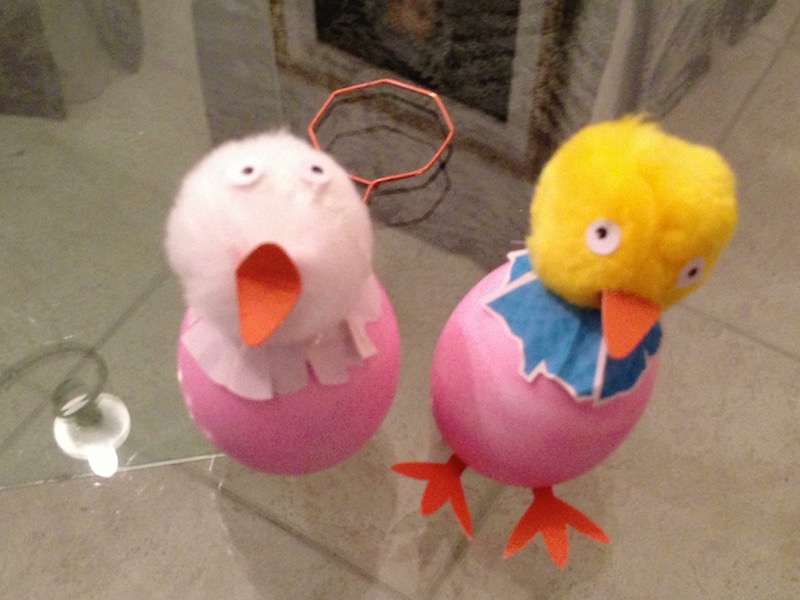Desiderata (Things To Be Desired)
Go placidly amid the noise and haste, and remember what peace there may be in silence. As far as possible without surrender be on good terms with all persons. Speak your truth quietly and clearly; and listen to others, even the dull and ignorant; they too have their story.
Avoid loud and aggressive persons, they are vexations to the spirit. If you compare yourself with others, you may become vain and bitter; for always there will be greater and lesser persons than yourself. Enjoy your achievements as well as your plans.
Keep interested in your own career, however humble; it is a real possession in the changing fortunes of time. Exercise caution in your business affairs; for the world is full of trickery. But let this not blind you to what virtue there is; many persons strive for high ideals; and everywhere life is full of heroism.
Be yourself. Especially, do not feign affection. Neither be cynical about love; for in the face of all aridity and disenchantment it is perennial as the grass.
Take kindly the counsel of the years, gracefully surrendering the things of youth. Nurture strength of spirit to shield you in sudden misfortune. But do not distress yourself with imaginings. Many fears are born of fatigue and loneliness. Beyond a wholesome discipline, be gentle with yourself.
You are a child of the universe, no less than the trees and the stars; you have a right to be here. And whether or not it is clear to you, no doubt the universe is unfolding as it should.
Therefore be at peace with God, whatever you conceive Him or Her to be, and whatever your labors and aspirations, in the noisy confusion of life keep peace with your soul.
With all its sham, drudgery and broken dreams, it is still a beautiful world. Be careful. Strive to be happy.
Max Ehrman
Epitaph (a poem)
When I die
Give what’s left of me away
To children
And old men that wait to die.
And if you need to cry,
Cry for your brother
Walking the street beside you
And when you need me,
Put your arms
Around anyone
And give to them
What you need to give to me.
I want to leave you something,
Something better
Than words
Or sounds.
Look for me
In the people I’ve known
Or loved,
And if you cannot give me away,
At least let me live in your eyes
And not on your mind.
You can love me most
By letting
Hands touch hands
By letting
Bodies touch bodies
And by letting go
Of children
That need to be free.
Love doesn’t die,
People do.
So, when all that’s left of me
Is love,
Give me away
Merrit Malloy
Heartbreak
Heartbreak is unpreventable; the natural outcome of caring for people and things over which we have no control, of holding in our affections those who inevitably move beyond our line of sight.
Heartbreak begins the moment we are asked to let go but cannot, in other words, it colors and inhabits and magnifies each and every day; heartbreak is not a visitation, but a path that human beings follow through even the most average life. Heartbreak is an indication of our sincerity: in a love relationship, in a life's work, in trying to learn a musical instrument, in the attempt to shape a better more generous self. Heartbreak is the beautifully helpless side of love and affection and is just as much an essence and emblem of care as the spiritual athlete's quick but abstract ability to let go. Heartbreak has its own way of inhabiting time and its own beautiful and trying patience in coming and going.
Heartbreak is how we mature; yet we use the word heartbreak as if it only occurs when things have gone wrong: an unrequited love, a shattered dream, a child lost before their time. Heartbreak, we hope, is something we hope we can avoid; something to guard against, a chasm to be carefully looked for and then walked around; the hope is to find a way to place our feet where the elemental forces of life will keep us in the manner to which we want to be accustomed and which will keep us from the losses that all other human beings have experienced without exception since the beginning of conscious time. But heartbreak may be the very essence of being human, of being on the journey from here to there, and of coming to care deeply for what we find along the way.
Our hope to circumvent heartbreak in adulthood is beautifully and ironically child-like; heartbreak is as inescapable and inevitable as breathing, a part and a parcel of every path, asking for its due in every sincere course an individual takes, it may be that there may be not only no real life without the raw revelation of heartbreak, but no single path we can take within a life that will allow us to escape without having that imaginative organ we call the heart broken by what it holds and then has to let go.
In a sobering physical sense, every heart does eventually break, as the precipitating reason for death or because the rest of the body has given up before it and can no longer sustain its steady beat, but hearts also break in an imaginative and psychological sense: there is almost no path a human being can follow that does not lead to heartbreak. A marriage, a committed vow to another, even in the most settled, loving relationship, will always break our hearts at one time or another; a successful marriage has often had its heart broken many times just in order for the couple to stay together; parenthood, no matter the sincerity of our love for a child, will always break the mold of our motherly or fatherly hopes, a good work seriously taken will often take everything we have and still leave us wanting; and finally even the most self compassionate, self examination should, if we are sincere, lead eventually to existential disappointment.
Realizing its inescapable nature, we can see heartbreak not as the end of the road or the cessation of hope but as the close embrace of the essence of what we have wanted or are about to lose. It is the hidden DNA of our relationship with life, outlining outer forms even when we do not feel it by the intimate physical experience generated by its absence; it can also ground us truly in whatever grief we are experiencing, set us to planting a seed with what we have left or appreciate what we have built even as we stand in its ruins.
If heartbreak is inevitable and inescapable, it might be asking us to look for it and make friends with it, to see it as our constant and instructive companion, and perhaps, in the depth of its impact as well as in its hindsight, and even, its own reward. Heartbreak asks us not to look for an alternative path, because there is no alternative path. It is an introduction to what we love and have loved, an inescapable and often beautiful question, something and someone that has been with us all along, asking us to be ready for the ultimate letting go.
David Whyte, Consolations
Value of the GNP
Too much and too long, we seem to have surrendered community excellence and community values in the mere accumulation of material things.
Our gross national product… if we should judge America by that – counts air pollution and cigarette advertising,
and ambulances to clear our highways of carnage. It counts special locks for our doors and the jails for those who break them.
It counts the destruction of our redwoods and the loss of our natural wonder in chaotic sprawl.
It counts napalm and the cost of a nuclear warhead, and armored cars for police who fight riots in our streets.
It counts Whitman's rifle and Speck's knife, and the television programs which glorify violence in order to sell toys to our children.
Yet the gross national product does not allow for the health of our children, the quality of their education, or the joy of their play.
It does not include the beauty of our poetry or the strength of our marriages; the intelligence of our public debate or the integrity of our public officials.
It measures neither our wit nor our courage; neither our wisdom nor our learning; neither our compassion nor our devotion to our country; it measures everything, in short, except that which makes life worthwhile.
And it tells us everything about America except why we are proud that we are Americans.
Robert F. Kennedy
The Man in the Arena
It is not the critic who counts; not the man who points out how the strong man stumbles, or where the doer of deeds could have done them better. The credit belongs to the man who is actually in the arena, whose face is marred by dust and sweat and blood; who strives valiantly; who errs, who comes short again and again, because there is no effort without error and shortcoming; but who does actually strive to do the deeds; who knows great enthusiasms, the great devotions; who spends himself in a worthy cause; who at the best knows in the end the triumph of high achievement, and who at the worst, if he fails, at least fails while daring greatly, so that his place shall never be with those cold and timid souls who neither know victory nor defeat.
Theodore Roosevelt
Relative Humanity
A human being is a part of the whole, called by us the “Universe,” a part limited in time and space. He experiences himself, his thoughts and feelings as something separate from the rest – a kind of optical delusion of his consciousness. This delusion is a kind of prison for us, restricting us to our personal desires and to affection for a few persons nearest to us.
Our task must be to free ourselves from this prison by widening our circle of compassion to embrace all living creatures and the whole of nature in its beauty. Nobody is able to achieve this completely, but the striving for such achievement is in itself a part of the liberation, and a foundation for inner security.
Albert Einstein
25 Principles for Adult Behavior
- Be patient. No matter what.
- Don’t badmouth: Assign responsibility, not blame. Say nothing of another you wouldn’t say to him.
- Never assume the motives of others are, to them, less noble than yours are to you.
- Expand your sense of the possible.
- Don’t trouble yourself with matters you truly cannot change.
- Expect no more of anyone than you can deliver yourself.
- Tolerate ambiguity.
- Laugh at yourself frequently.
- Concern yourself with what is right rather than who is right.
- Never forget that, no matter how certain, you might be wrong.
- Give up blood sports.
- Remember that your life belongs to others as well. Don’t risk it frivolously.
- Never lie to anyone for any reason. (Lies of omission are sometimes exempt.)
- Learn the needs of those around you and respect them.
- Avoid the pursuit of happiness. Seek to define your mission and pursue that.
- Reduce your use of the first personal pronoun.
- Praise at least as often as you disparage.
- Admit your errors freely and soon.
- Become less suspicious of joy.
- Understand humility.
- Remember that love forgives everything.
- Foster dignity.
- Live memorably.
- Love yourself.
- Endure.
John Perry Barlow



















